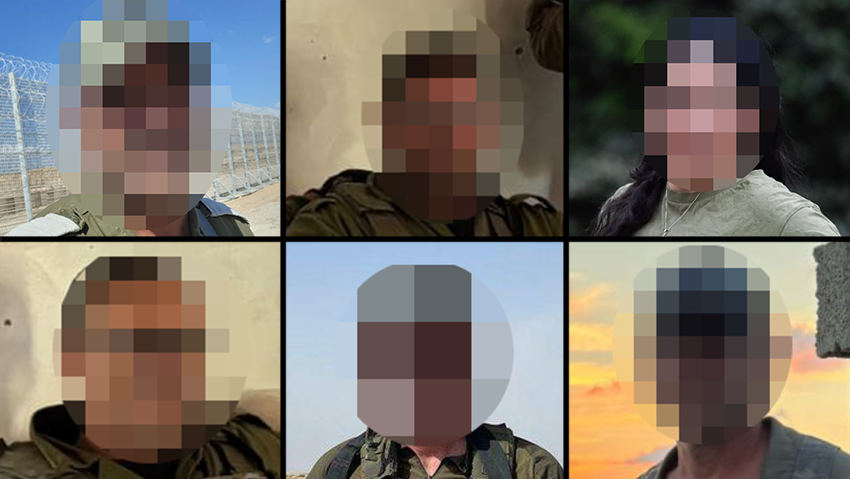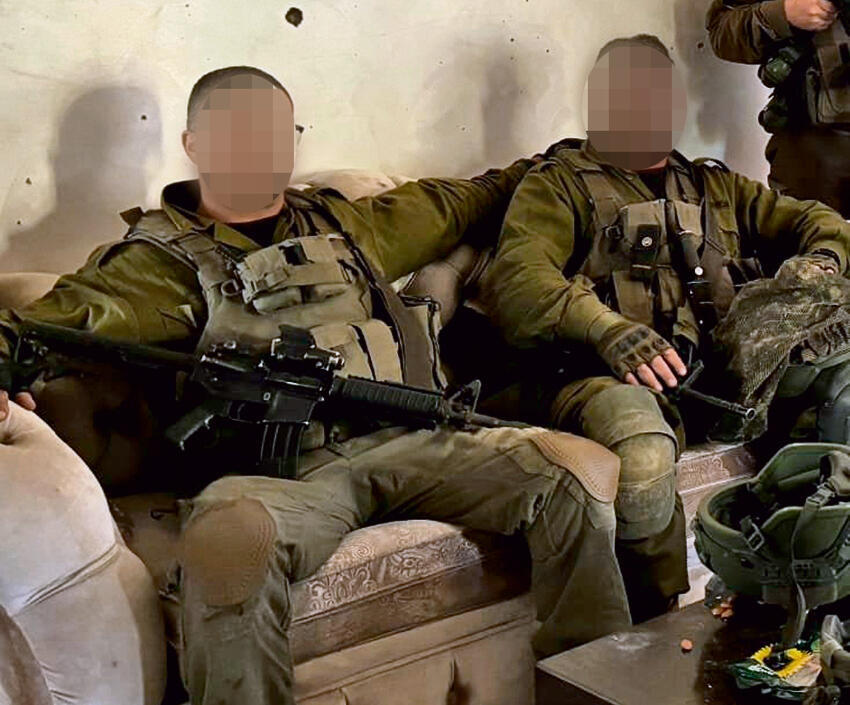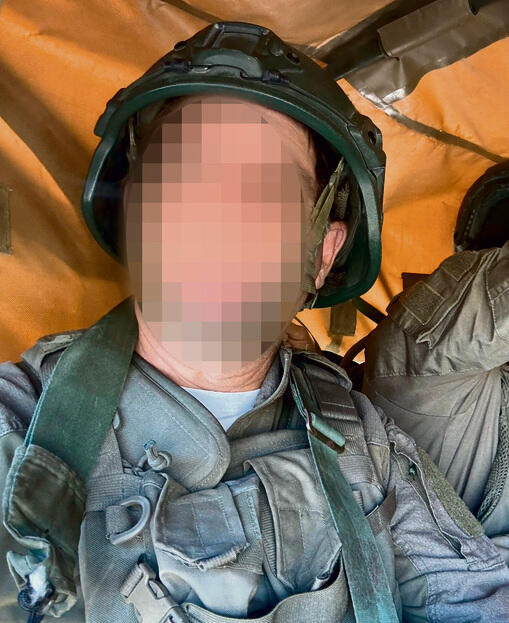Getting your Trinity Audio player ready...
Tzahi, a father of four from Givat Shmuel, enlisted as a combat soldier in the Givati Brigade in 1988 and was discharged from reserve duty with the rank of major in his late 30s 15 years ago. However, when the war broke out, he tried every possible way to return to service.
"I reached out to everyone—commanders and friends still serving in the battalion I had been discharged from," he explained. "I was willing to do whatever was needed. I said I was in good shape and knew I could contribute. When I heard there was a shortage of officer positions, I even offered to enlist as a regular soldier. But in the early days of the war, the chaos was overwhelming, and I encountered unbearable bureaucracy. They didn’t know how to handle my request."
When the Yael Force was established to strengthen emergency response teams—known as alert squads—in the Gaza border region, Tzahi applied. At the same time, he also reached out to the David Division, deciding to report to whichever unit responded first. About six months later, after completing the necessary administrative processes, he was called up for operational duty with the Yael Force. Since then, he has already completed 125 days of reserve service.
"It’s a process that requires a lot of effort—submitting resumes, providing documents, signing forms," he shared. "It’s a big oversight on the part of IDF that it took so long to allow me to come back from exemption. Even now, as we serve, we don’t really feel like part of the unit, like regular reserve soldiers with continuity."
Like Tzahi, many others who were previously exempt from reserve duty have decided to give up their exemptions and return to service. They understand the urgency of the situation. While this alone won’t fill the gaps in manpower—gaps that also require the recruitment of thousands of young ultra-Orthodox men—they believe they can still contribute and reinforce the IDF. However, the path to re-enlistment is not always simple.
Asaf Waiss, who lost his brother, Warrant Officer (res.) Elon Waiss, in the war, co-founded and leads the Returning to Uniform initiative with his two other brothers. This program helps those exempt from reserve duty rejoin the military. The late Elon Waiss himself gave up his reserve exemption, and now, his brothers—who were also discharged due to their age—have chosen to return to service as well.
"This project reflects my brother’s spirit—that’s how he lived," Asaf explained. "From our experience, with a few simple and targeted actions, thousands of people with exemptions can be brought back to active duty in a short amount of time. This is a pool of high-quality individuals, already trained and ready to enlist immediately with high motivation. Through the initiative, we’ve supported 6,000 people who wanted to return to service, and we successfully brought 1,800 of them back to active duty. Many have already completed their second or third tours."
He emphasized the urgent need: "Commanders are still requesting immediate help in recruitment, sharing that they are deploying with a 30% shortage in manpower. We see enormous potential among those exempt from duty who want to return, and we hope the IDF will streamline the re-enlistment process to enable these people to return to service immediately. The system should ease the process, not exhaust them with bureaucracy. The field needs them now."
Erez, 54, a father of six, was discharged from active duty in the elite Maglan Unit and moved abroad to Los Angeles at the age of 26. His extended stay abroad removed him from the reserve roster. However, during 2002's Operation Defensive Shield, he volunteered to return to service. In the Gaza war, Erez held a double exemption—both due to living abroad and being over 40. Thanks to Returning to Uniform, he managed to rejoin, reporting for his first reserve duty with the Yael Force this past October. At the end of the deployment, he decided to return to Israel permanently.
"It’s clear to me, and it should be clear to everyone, that if I’m fit and able to serve, it’s my duty to give up the exemption," he said. "I meet people at work in their 30s who served as combat soldiers in the past but don’t report for reserve duty because they weren’t needed before. That’s absurd—we’re in an existential war. There’s still so much to do. Put on your uniforms, guys."
He added: "We can criticize the ultra-Orthodox for not enlisting all we want, and there’s no doubt that those who aren’t truly dedicated to Torah study must serve. But it will take time for them to integrate into the IDF. Meanwhile, Israeli society has a pool of available, high-quality and capable individuals who, with just a few days of training, could form entire combat brigades."
Tomer, 49, a father of three from Gan Yochanan, has completed 150 days of reserve duty during the war. Shai, 48, a father of four from Mishmar HaEmek, has racked up 120 days. The two met during reserve service after both gave up their exemptions.
Tomer shared: "On October 8, I got a call asking if I’d join a specific mission. Very quickly, we became part of the platoon and served as regular soldiers. I feel like there was a small window of opportunity at the beginning of the war. Once we said yes, we were enlisted very quickly. A month later, it was already much harder. I know 15 guys who served with me in the past who want to come back but are facing challenges. When we entered Lebanon, we desperately needed reinforcements for logistical roles. We called people who agreed to come, but in the end, we weren’t able to recruit them. It’s a shame—these are capable people willing to contribute."
On his decision to waive his exemption, Tomer said: "I couldn’t stand idly by—I understood the gravity of the moment. When we, the ‘older guys,’ joined, it gave the younger soldiers a lot of confidence. ‘If they’re here, who am I to leave?’" Shai added: "The young soldiers are energized when the older ones show up."
Shai also shared his frustrations: "We’re carrying a heavy burden. We’ve given hundreds of days, put our lives on hold and come because this country matters to us. It’s frustrating when others choose not to participate, but that can’t stop us from serving."
Get the Ynetnews app on your smartphone: Google Play: https://bit.ly/4eJ37pE | Apple App Store: https://bit.ly/3ZL7iNv
Yarden, a mother of four from Nahariya and a social worker by profession, completed civilian national service but decided to join the reserves after the war broke out. She now serves in the casualty assistance unit. "I knew I could contribute a lot under the current circumstances," she said.
"I also felt it was a sort of redemption for me, to enlist in the army like I wanted to when I was younger. People ask how I did it. I submitted the necessary forms and called the recruitment center non-stop until they summoned me for initial processing. Afterward, I kept pushing until I was enlisted. When I hear about professionals who want to join the reserves but face obstacles, it really frustrates me. The army needs them. There should be an easier, more accessible process to bring them in."





